Survey of attitudes toward career and job changes in the COVID-19 crisis: 70% of respondents indicated a change in their attitude toward career and job changes; 50% of these respondents want to work remotely
en world Japan K.K. (headquarters: Chuo City, Tokyo, President: Vijay Deol), one of Japan’s largest recruiting firms specializing in global human resources, conducted a questionnaire survey on changes in attitudes toward career and job changes in the COVID-19 crisis, and 4,636 registered users of en world Japan’s service responded.
Summary of survey result
・70% of respondents indicated a change in their attitude toward career and job changes.
・50% of respondents who changed their attitude toward career and job changes want to adopt a new way of working that allows them to work remotely most of the time.
・60% of respondents who changed their attitude toward career and job changes started collecting information to think about a future career.
・ When asked what they were studying to develop skills, most respondents indicated that they were studying English, followed by programming.
・20% of respondents looking for a new job said that they had started looking after the COVID-19 outbreak.
・70% of respondents voluntarily started looking for a new job after the COVID-19 outbreak while 24% have done so involuntarily. The percentage of foreign capital company employees who started looking for a new job involuntarily is 2.5 times greater than that of Japanese company employees.
・70% of respondents who stopped looking for a new job after the COVID-19 outbreak want to wait and see until the COVID-19 outbreak ends.
・70% of respondents looking for a new job want to change jobs within six months, and 40% of those want to do so as soon as they find a nice job.
[Comments on the results]
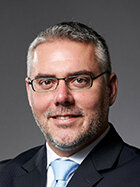
Vijay Deol, President&Representative Director
The COVID-19 pandemic has had an impact on all aspects of our lives and careers and job changes are no exception. Concerns about health and safety, job security, working style, and the economy in general are all influencing job seekers’ behavior. While people are still thinking about their careers and many people still intend to change jobs in the short term, motivations and priorities are changing. Some people are more hesitant to move as there is greater uncertainty while some people fear for their current job security and are eager to move to a more stable situation. Employee engagement and changes in working style have also come to the forefront. Employers who have prioritized their employees’ health and safety are likely to see more loyalty whereas companies who have fallen short in this area will see engagement decline. In addition, working environment and, particularly, flexible working conditions such as the ability to work remotely and with flexible hours are now very important priorities for candidates choosing a new company to work for. As the economy evolves and eventually recovers Japan’s labor shortage will persist and the competition for talent will continue. However, in the post-COVID 19 world companies will need to adjust to job seekers’ changes in attitude and priorities, more carefully considering health and safety, job security, work environment, and flexibility if they are to win the competition for top talent.
Details of survey results
1. 70% of respondents indicated a change in their attitude toward career and job changes. (Fig. 1)
When asked whether there was a change in attitude toward future career and job changes due to the COVID-19 outbreak, 74% of respondents answered that there was a significant or slight change. (Foreign company employees: 73%, Japanese company employees: 74%)
[Fig. 1] Was there any change in your attitude toward future career or job changes due to the COVID-19 outbreak?
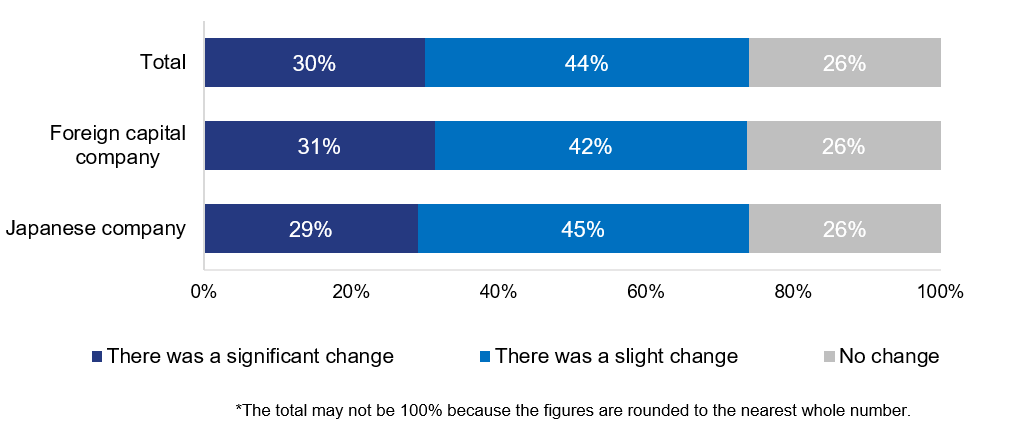
2.50% of respondents who changed their attitude toward career and job changes want to adopt a new way of working that allows them to work remotely most of the time. (Fig. 2)
We asked respondents who indicated a significant or slight change in their attitude toward career and job changes how their attitude changed. “Want to adopt a new of working that allows me to work remotely” was chosen by 50% of them (foreign capital company employees: 52%, Japanese company employees: 50%), followed by “increased motivation for individual ability/skill development” (foreign company employees: 45%, Japanese company employees: 47%).
[Fig. 2] Please respond if there was a significant or slight change. How has your attitude changed? (By their company’s capital type, multiple answers allowed)
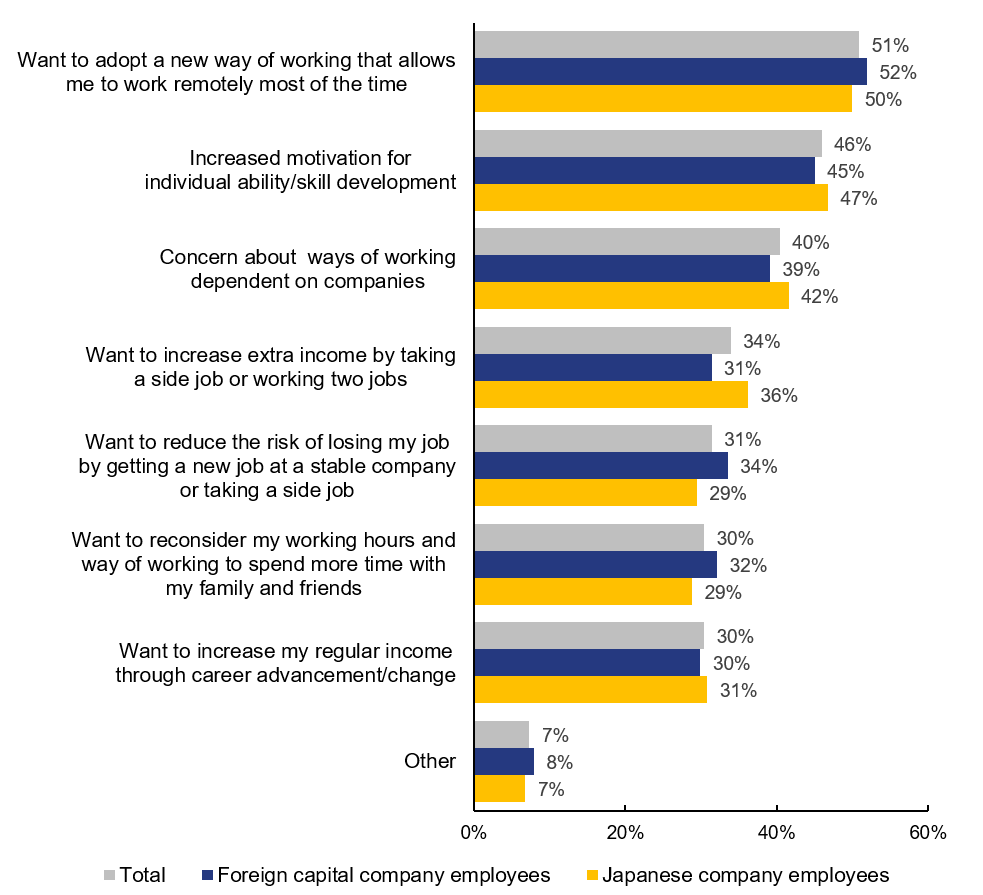
3.60% of respondents who changed their attitude toward career and job changes started collecting information to think about a future career. (Fig. 3)
We asked respondents who indicated a significant or slight change in attitude toward career and job changes whether they were doing something; 60% responded that they had started collecting information to think about a future career (job changes, career advancement, side jobs, etc.)
(Foreign capital employees: 55%, Japanese company employees: 60%).
[Fig. 3] Please respond if there was a significant change or a slight change. Is there anything you have started working on? (Multiple answers allowed)
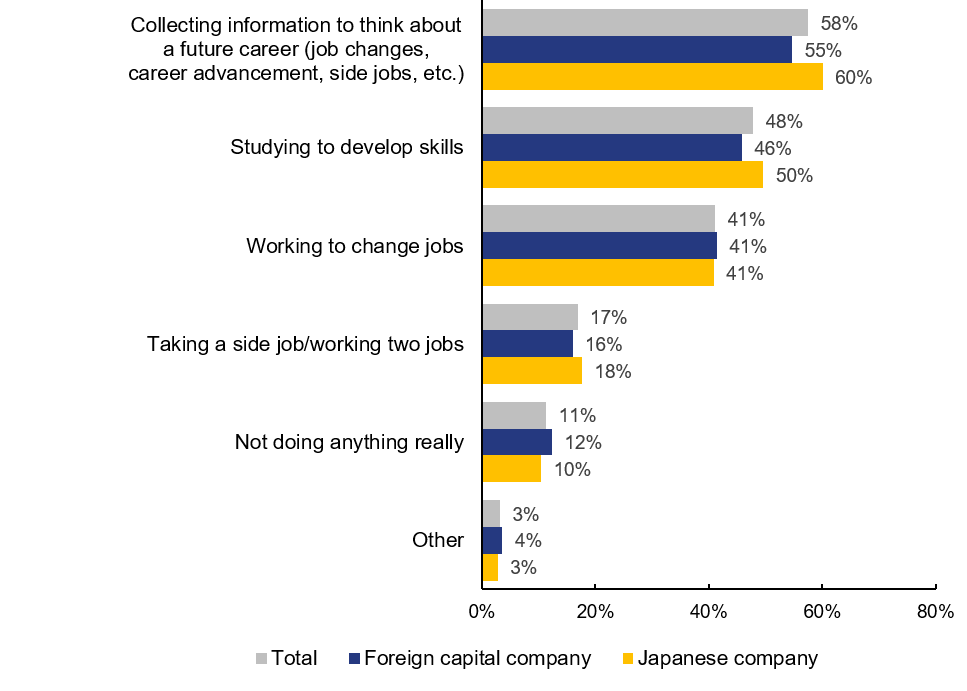
4.When asked what they were studying to develop skills, most respondents indicated that they were studying English, followed by programming. (Fig. 4)
We asked respondents what they were studying to develop skills. English was chosen by the largest percentage of both foreign capital and Japanese company employees (foreign capital company employees: 63%, Japanese company employees: 62%), followed by programming (foreign capital company employees: 18%, Japanese company employees: 26%).
[Fig. 4] Please respond if you are studying to develop skills. What are you studying?(Multiple answersallowed)
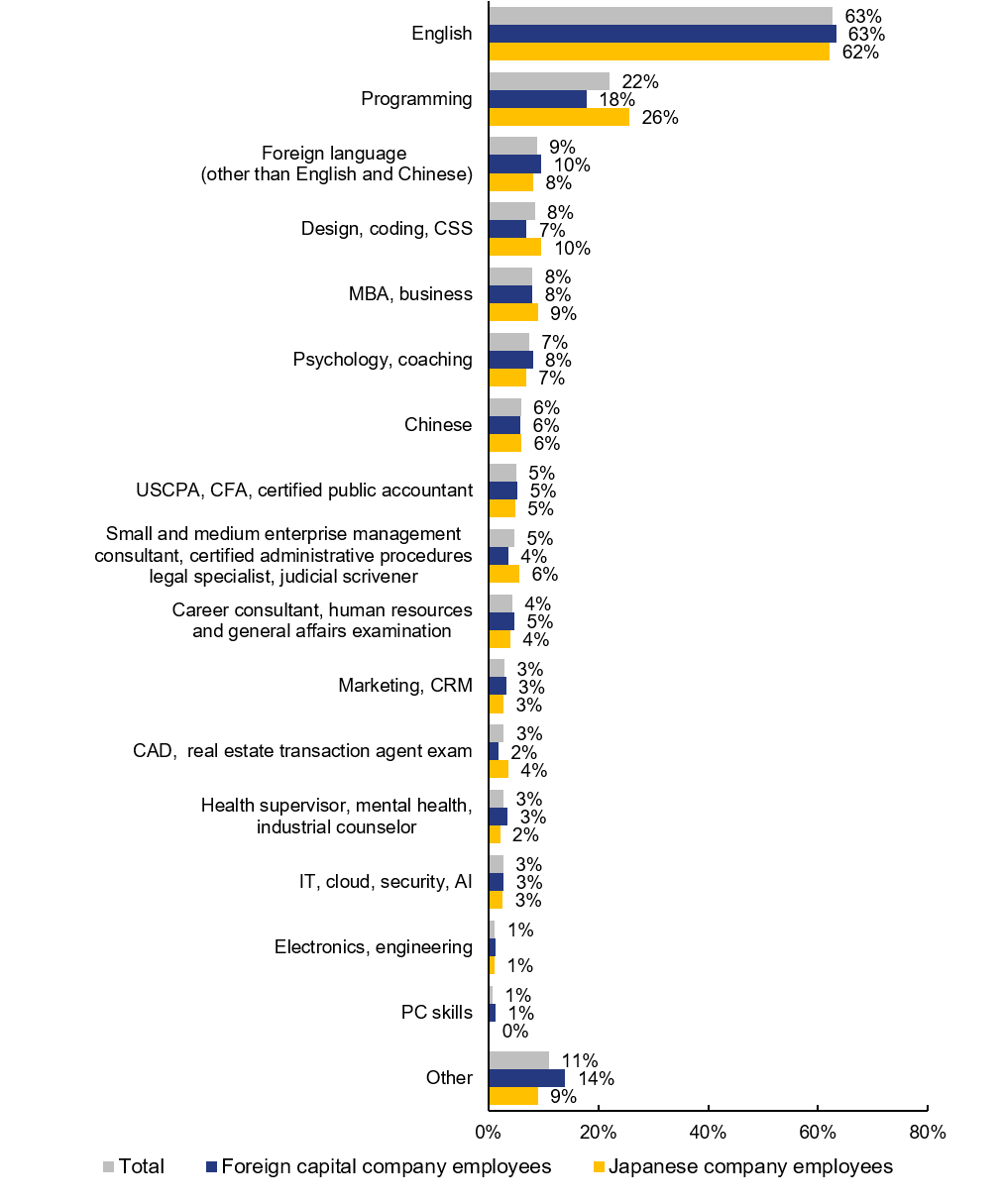
5.20% of respondents looking for a new job said that they had started looking after the COVID-19 outbreak. (Fig. 5, Fig. 6)
When asked whether they were looking for a new job, approx. 40% of respondents were currently looking for a new job. (Foreign capital company employees: 43%, Japanese company employees: 43%). Approx. 30% of respondents were considering whether to begin the search for a new job (foreign capital company employees: 27%, Japanese company employees: 29%).
We asked respondents currently looking for a new job when they started; a little less than 20% had started looking for a new job after the COVID-19 outbreak.
[Fig. 5] Are you currently looking for a new job?
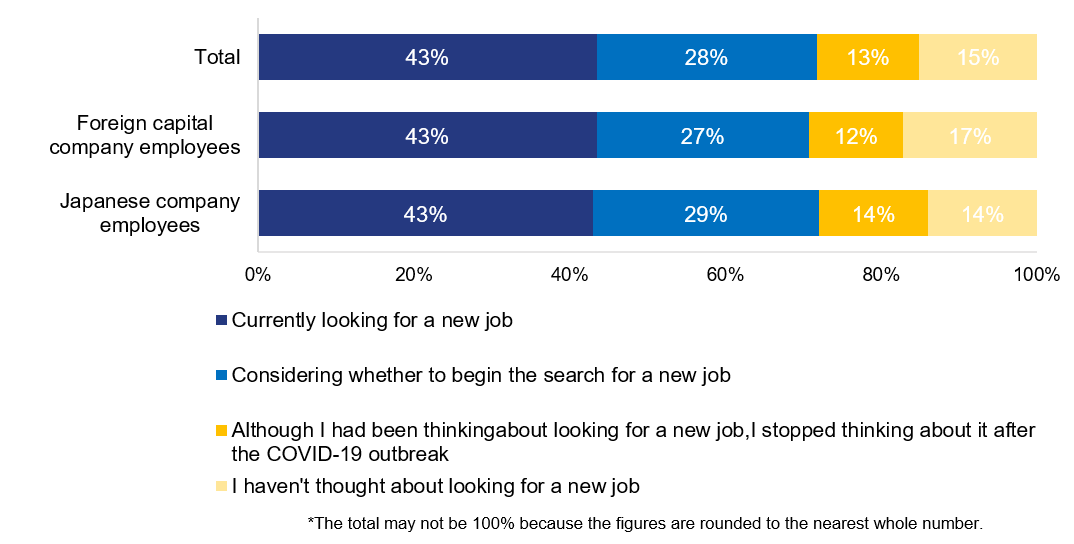
[Fig. 6] Please respond if you are currently looking for a new job. Have you been looking for a new job since before the COVID-19 outbreak?
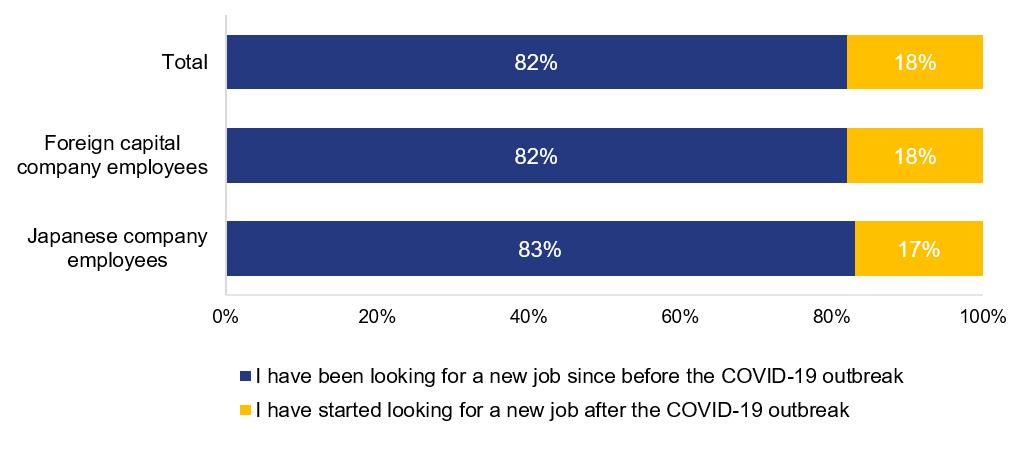
6.70% of respondents voluntarily started looking for a new job after the COVID-19 outbreak while 24% have done so involuntarily. The percentage of foreign capital company employees who started looking for a new job involuntarily is 2.5 times greater than that of Japanese company employees. (Fig. 7)
When asked why they started looking for a new job after the COVID-19 outbreak, the percentage of foreign capital company employees who started looking for a new job involuntarily (corporate restructuring, job loss, etc.) was higher than that of Japanese company employees who responded the same by 21 points. (Foreign capital company employees: 35%, Japanese company employees: 14%) Foreign capital companies seem to be cutting more employees than Japanese companies because they give no quarter when it comes to employment.
[Fig. 7] Please respond if you started looking for a new job after the COVID-19 outbreak. Why did you start looking for a new job?
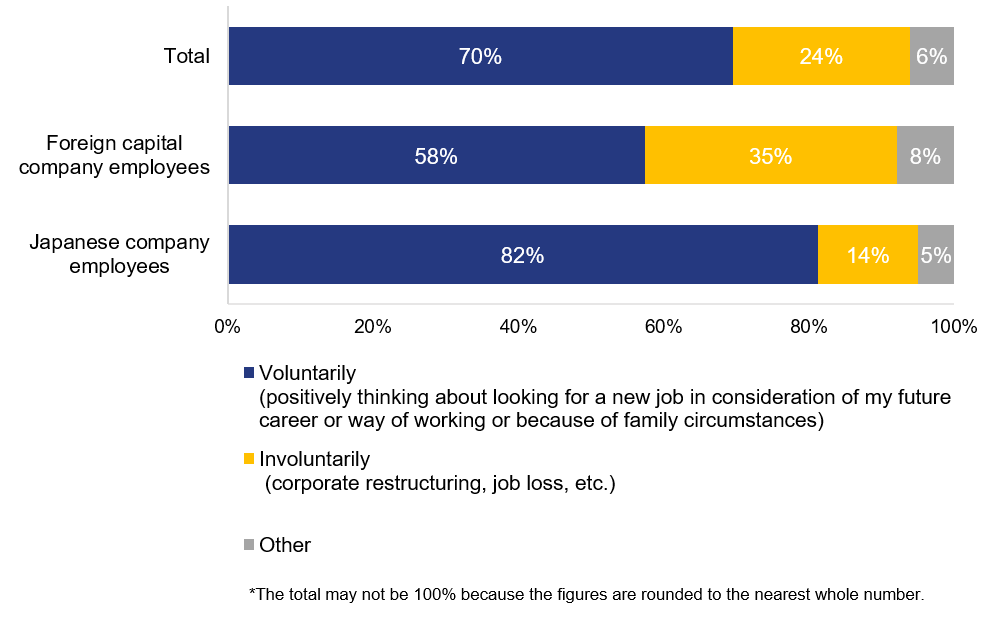
7. 70% of respondents who stopped looking for a new job after the COVID-19 outbreak want to wait and see until the COVID-19 outbreak ends. (Fig. 8)
We asked respondents why they had stopped thinking about looking for a new job after the COVID-19 outbreak, although they had been thinking about it. The largest percentage wanted to wait and see until the COVID-19 outbreak ended (foreign capital company employees: 72%, Japanese company employees: 69%), and the second largest percentage were anxious about changing jobs under uncertain circumstances (foreign capital company employees: 76%, Japanese company employees: 63%).
[Fig. 8] Please respond if you stopped thinking about looking for a new job after the COVID-19 outbreak, although you had been thinking about it . Why did you stop? (Multiple answers allowed)
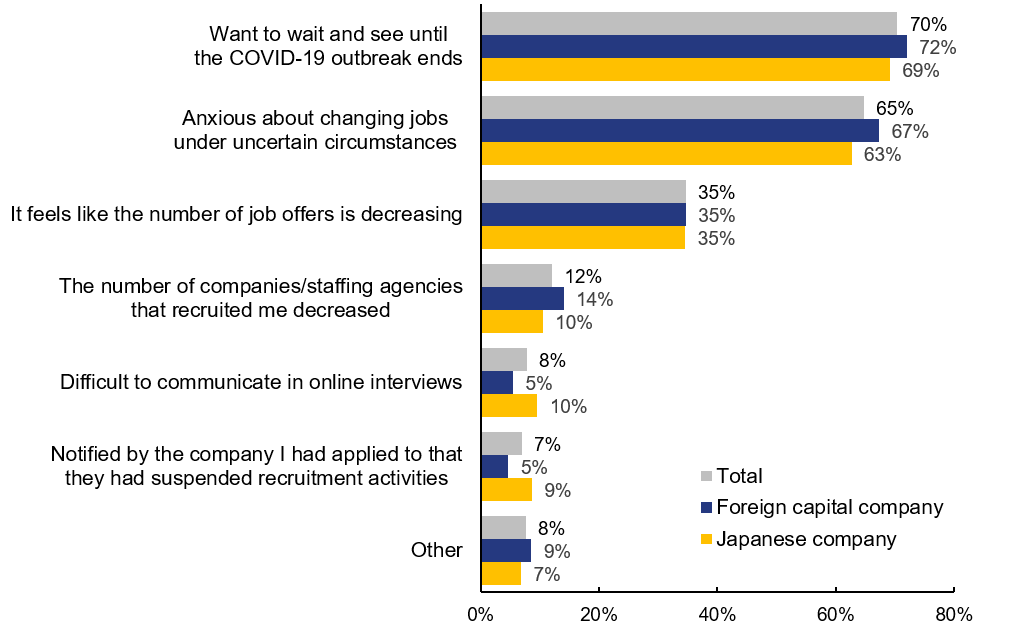
8.70% of respondents looking for a new job want to change jobs within six months, and 40% of those want to do so as soon as they find a nice job. (Fig. 9)
We asked respondents, who are currently looking for a new job or consider looking for a new job, when they want to change jobs. Approx. 70% of respondents want to change jobs within six months (*1), and 40% of those want to change jobs as soon as they find a nice job. (Foreign capital company employees: 72%, Japanese company employees: 65%) *1: Total of respondents who want to change jobs as soon as they find a nice job, within three months, and within six months.
We will explain why they want to change jobs within six months. Responses that stood out include “currently unemployed” and “because I think we will face a more difficult situation” from respondents who want to change jobs as soon as they find a nice job, “handover and other duties will be finished by then” and “the timing of bonus payment” from those who want to change jobs within three months, and “I think the COVID-19 situation will be under control” from those who want to change jobs within six months.
[Fig. 9] By when do you want to change your job?
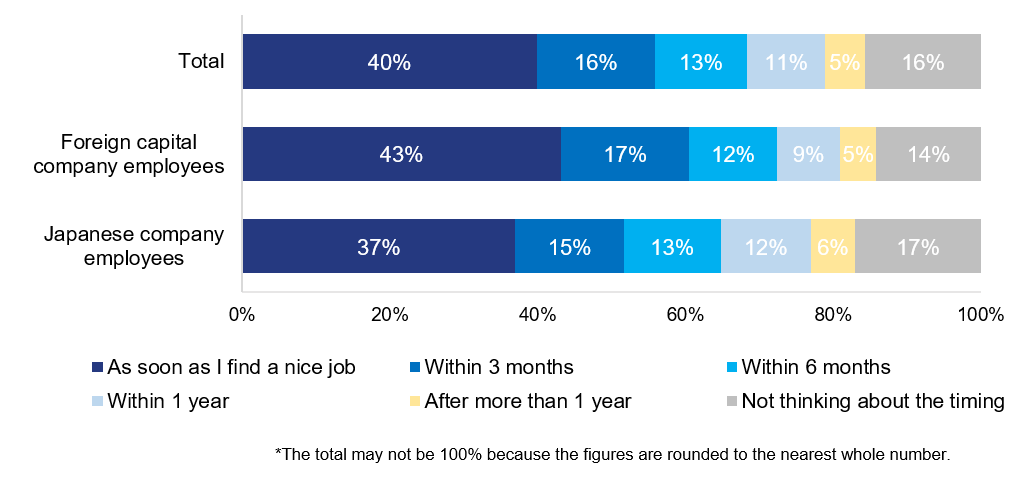
▶ When respondents want to change jobs and why
As soon as they find a nice job
・I think the situation in the mid-career job market will be more difficult. (Foreign capital company employee, 30s)
・I was fired at the end of April. (Foreign capital company employee, 40s)
・I have a clear career plan. (Foreign capital company employee, 40s)
・Because I’m working for a foreign capital company, I’m worried that the company might pull out of Japan because of the COVID-19 outbreak. (Foreign capital company employee, 50s)
・I have been willing to change my job if the opportunity arises. (Foreign capital company employee, 50s)
・To advance my own career. (Japanese company employee, 30s)
・My bonus was cut, and my promotion was canceled because of the COVID-19 outbreak. (Japanese company employee, 40s)
・I have decided to change jobs to one where I can make a living doing what I love. (Japanese company employee, 40s)
・I always want to try a new job if there is a nice one. (Japanese company employee, 50s)
・I have already resigned because of the COVID-19 outbreak. (Japanese company employee, 50s)
Within three months
・The timing of the bonus payment (Foreign capital company employee, 30s)
・Because I don’t know when things will change in our company. (Foreign capital company employee, 40s)
・Considering when my current project ends and the time I need to negotiate my resignation with the company (Japanese company employee, 30s)
・I need one month or so for handovers (Japanese company employee, 40s)
Within six months
・I will not be sure how the mid-career job market will change or how much influence the COVID-19 outbreak will have on companies within the coming six months or so. (Foreign capital company employee, 40s)
・I think the COVID-19 outbreak will have less of an impact on society. (Foreign capital company employee, 50s)
・I think I can look at the COVID-19 situation and make a decision dispassionately in six months. (Japanese company employee, 40s)
・ I want to start a new career as soon as society recovers from COVID-19. (Japanese company employee, 40s)
------------------------------------------------------------------------------------
[Outline of the survey]
Survey method: Online survey
Area: Japan
Period: May 19 - May 21, 2020
Number of valid answers: 4,636 registered users of career change support services
Respondent attribute: Registered users of career change support services/Foreign capital company employees: 48%, Japanese company employees:52%
------------------------------------------------------------------------------------
▼Download the Document(PDF)
Survey of attitudes toward career and job changes in the COVID-19 crisis_en world Japan.pdf
About en world Japan (https://www.enworld.com/)
en world Japan is a staffing firm established in 1999 specializing in global human resources with offices in four countries in the Asia-Pacific region. We specialize in supporting Foreign Capital Companies and global Japanese companies in recruiting human resources for middle to high level positions. We help companies with recruitment and job seekers with career changes from every angle by staffing full-time workers, professional human resources, and executive human resources and providing recruitment process outsourcing solutions.
Contact information for inquiries about this news release
en world Japan K.K. PR representative
Email : enworld-pr@enworld.com
Tokyo Square Garden 12F, Kyobashi 3-1-1, Chuo-ku, Tokyo 104-0031
